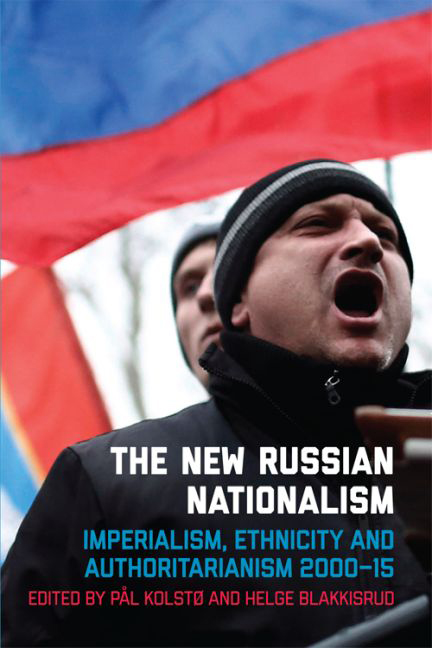Book contents
- Frontmatter
- Contents
- List of Figures
- List of Tables
- Acknowledgements
- Notes on Contributors
- Introduction: Russian nationalism is back – but precisely what does that mean?
- 1 The ethnification of Russian nationalism
- 2 The imperial syndrome and its influence on Russian nationalism
- 3 Radical nationalists from the start of Medvedev's presidency to the war in Donbas: True till death?
- 4 Russian ethnic nationalism and religion today
- 5 Everyday nationalism in Russia in European context: Moscow residents’ perceptions of ethnic minority migrants and migration
- 6 Backing the USSR 2.0: Russia's ethnic minorities and expansionist ethnic Russian nationalism
- 7 Rallying ’round the leader more than the flag: Changes in Russian nationalist public opinion 2013–14
- 8 How nationalism and machine politics mix in Russia
- 9 Blurring the boundary between civic and ethnic: The Kremlin's new approach to national identity under Putin's third term
- 10 Russia as an anti-liberal European civilisation
- 11 Ethnicity and nationhood on Russian state-aligned television: Contextualising geopolitical crisis
- 12 The place of economics in Russian national identity debates
- Bibliography
- Index
10 - Russia as an anti-liberal European civilisation
- Frontmatter
- Contents
- List of Figures
- List of Tables
- Acknowledgements
- Notes on Contributors
- Introduction: Russian nationalism is back – but precisely what does that mean?
- 1 The ethnification of Russian nationalism
- 2 The imperial syndrome and its influence on Russian nationalism
- 3 Radical nationalists from the start of Medvedev's presidency to the war in Donbas: True till death?
- 4 Russian ethnic nationalism and religion today
- 5 Everyday nationalism in Russia in European context: Moscow residents’ perceptions of ethnic minority migrants and migration
- 6 Backing the USSR 2.0: Russia's ethnic minorities and expansionist ethnic Russian nationalism
- 7 Rallying ’round the leader more than the flag: Changes in Russian nationalist public opinion 2013–14
- 8 How nationalism and machine politics mix in Russia
- 9 Blurring the boundary between civic and ethnic: The Kremlin's new approach to national identity under Putin's third term
- 10 Russia as an anti-liberal European civilisation
- 11 Ethnicity and nationhood on Russian state-aligned television: Contextualising geopolitical crisis
- 12 The place of economics in Russian national identity debates
- Bibliography
- Index
Summary
In this chapter I agree with Henry Hale's double argument that Putin has generally avoided making nationalism a central element of his popular appeal, and that the majority of the population has not interpreted Putin as a standard-bearer of nationalism – other, competing political groups are more distinctly associated with the nationalism niche. I share the view that in his third presidential term, marked by a sharp decrease in popular support and the anti-regime protests of 2011/12, Putin has been advancing a conservative value agenda in order to reinforce some of the regime's constituencies and to marginalise the liberals – and the nationalists. However, I challenge the view, advanced in several chapters in this volume, that Putin has suddenly brought nationalism into the picture, despite what is widely said about his ‘shift’ toward ethnonationalism during the Ukrainian crisis.
I interpret Putin's use of the term russkii in his 18 March 2014 speech justifying the annexation of Crimea as simply reflecting what had already become the mainstream use of the term. The term russkii is employed in a very blurry way to define both what is Russian by culture (and culture has always been more important than ethnicity: Russian culture is russkaia, not rossiiskaia, even if Gogol is of Ukrainian origin and Vasilii Grossman from a Jewish family) and in relation to the state in general. While rossiiskii is still used by those who identify with ethnic minorities to dissociate their ethnic from their civic identity, for most of the 80 per cent of those citizens who are both russkie and rossiiane, rossiiskii has a purely official flavour: it is used in speaking about Russia in terms of citizenship, legal system and what pertains to the state as an administration, whereas russkii is increasingly associated with ‘everything Russian’, and therefore also as the Russian state understood in its historical longue durée.
- Type
- Chapter
- Information
- The New Russian NationalismImperialism, Ethnicity and Authoritarianism 2000–2015, pp. 275 - 297Publisher: Edinburgh University PressPrint publication year: 2016

